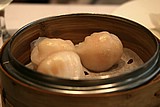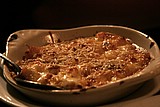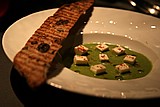Home |
Restaurants by City
|
Food Photography |
Archive | Philosophy |
![]()
Right now we are eating in Seattle, Washington.
|
Monday
2004
Permalink
|
Writing About Food, November 22, 2004 — This website exists to document my experiences with eating great (and sometimes not-so-great) food. Invariably, when you write almost 300 posts, most about meals and eating at various restaurants, cafes, bakeries, and food stands, people are going to call you a “food critic”. On the one hand there’s no doubt I think critically about the food I eat. But a “food critic”? I have to admit that title feels a little like an epithet to me. Let’s start at the beginning. Anywhere there are creative people expressing themselves (especially for money) there grows a cottage industry around criticizing what those creative people do. I’m not (at least in this post) trying to get into a discussion of whether cooking is art, craft, or something in between, but cooking and creating food in general does appear to be one of those creative endeavors that has inspired a legion of people who spend their life and make their living criticizing other people’s cooking and creativity. Some of the people who write about food for a living (possibly even many of them) are simply thrilled about sharing their love of food with others. Many are counting their lucky stars that their paid to do this. Others do it even without being paid – note the hundreds of food blogs that have sprouted up all over the net over the last couple of years. Others however (and by my take this is the majority) appear to be taken mostly with themselves as opposed to the food and food producers they’re paid to write about. How do I know this? I’ll tell you. There are two things that tell me. The first is the myth under which most food critics operate. The second is the drivel most food critics produce. Let’s start with the myth. The myth is one of objectivity. It starts with the employers of most food critics in the nation – commercial media, mostly newspapers. The people who write for newspapers are called journalists. Journalists build their credibility on the notion that they are objective. The more textured among them will fully acknowledge that complete objectivity is impossible, and their real goal is to be honest, fair, and balance (though the latter of those two have been co-opted in the most sad and ironic fashion by a media outlet that clearly is neither). My point here is not to take a position on some part of the red/purple/blue spectrum but rather to point out that the notion of being objective in writing about food is silly. Not so says the Association of Food Journalists. In fact, in their "Food Critics' Guidelines", they claim that “Good restaurant reviewing is good journalism. Reviewers should subscribe to the same accepted standards of professional responsibility as other journalists.” The give specifics on how to achieve this: “The Association believes that the primary responsibility of food journalists is to serve the public interest by reporting the news accurately and as objectively as possible. (1) Gifts, favors, free travel or lodging, special treatment or privileges can compromise the integrity and diminish the credibility of food journalists, as well as that of their employers. This includes commercially sponsored contests. Such offers should be avoided. An example is a contest promoting specific food products that is open to food journalists only. (2) Similarly, food journalists should not use their positions to win favors for themselves or for others.” There are a bunch of others, but my favorite is “(8) Because of the controversial nature of many food-related topics, food journalists accept the obligation to acknowledge opposing views on such issues.” Now I am sure that most restaurant critics do their utmost to follow all these rules to the letter, but my take is that it’s borderline impossible to follow these rules, and completely impossible to follow the spirit of them. Whether they want to acknowledge it or not, most reviewers portraits are plastered to the bulletin boards of kitchens all over their respective “beats” right next to the OSHA mandated postings. Waiters are trained to look for the critics and relay the information when one is spotted to the folks in the kitchen who do their utmost to treat the reviewer like a king (or queen as the case may be). Additionally, many reviewers get discounts and freebies. Maybe not at the actual meal where they are reviewing the restaurant, but at others. Chefs and restaurateurs have confirmed this to me privately. And let’s say for argument’s sake that a critic goes through all sorts of trouble to stay unrecognized, refuses all freebies, and follows all the other rules and guidelines. They still are not, in my opinion, able to follow the spirit of the guidelines. Again, I know it’s a generalization, but my impression is that many food critics get carried away with themselves. Everyone has met people in life who squeeze every last drop of leverage and superiority from the small positions of power they wield. In the worst cases this small taste of power results in an overinflated sense of self-worth and expertise. There’s nothing worse than critics who feel that their positions on newspapers and other media outlets somehow make them experts at food. This is like disc jockeys who get their job because of the quality of their voice, but have come to believe they are now experts on music, determining what’s good and what isn’t. The best journalists food or otherwise readily admit their biases, the things that color their opinion, and the context for their thinking. Recently the editors of Slate magazine decided to tell the world how they were going to vote in the Presidential election. In “Our case for journalistic disclosure” Jacob Weisberg says much more eloquently than I ever could when he explains that one of the reasons they did it was “to emphasize the distinction between opinion and bias. Journalists, like people, have opinions that influence their behavior. Reporters and editors at most large news organizations in the United States are instructed to keep their opinions to themselves to avoid creating an impression of partisanship. Len Downie, the executive editor of the Washington Post, famously goes so far as to avoid even voting. Slate, which is a journal of opinion, takes precisely the opposite approach. Rather than bury our views, we cultivate and exhibit them. A basic premise of our kind of journalism is that we can openly express what we think and still be fair. Fairness, in the kind of journalism Slate practices, does not mean equal time for both sides. It does not mean withholding judgment past a reasonable point. It means having basic intellectual honesty. When you advance a hypothesis, you must test it against reality. When you make a political argument, you must take seriously the significant arguments on the other side. And indeed, Slate writers tend to be the sort of people who relish opportunities to criticize their own team and give credit to their opponents. Or so we'd like to think. By disclosing our opinions about who should be president, we're giving readers a chance to judge how well we are living up to these ideals.” And while the practice of writing about food is not of the same importance as writing about politics (in either direction depending on your outlook on life) here at tastingmenu we try to live up to these same ideals. And why aren’t these the ideals of the Association of Food Journalists? The thing is that it is impossible to be objective about food. Food is an emotional component of our lives. You cannot convince me that Bella Cooperman, my father’s mother, didn’t make the best chicken soup ever in the history of planet earth. Nor can you convince me that my other grandmother, Goldie Jackson, didn’t make the best small apricot filled pastries(the unfortunately named Apricot Pasties). And while I’m sure each and every one of you would agree with me on how perfect these dishes were (if only my grandmothers were alive to make them for all of us) the flavors in these dishes are so intertwined with my memories of my grandmothers that it’s really impossible for me to separate the two. This shouldn’t be a surprise to anyone who has wonderful memories that involve food. Smell is a critical part of tasting food, and smell is also linked very closely to memory (both positive and negative). It doesn’t bother me that objectivity is impossible. What bothers me is people who under the mantle of objectivity spout their opinions as if they have some greater value than any other person’s perception. Even, Jeffrey Steingarten, his quality writing I aspire to achieve a fraction of, said at one point that there were several restaurants he loved so much he frequented them regularly and therefore would never write about them. I say why not? Do I imagine that just because he’s become friendly with the chef that all of a sudden he loves the food even if it sucks? Maybe he became friendly with the person making the food because the food was so good in the first place. I feel cheated not knowing the names of those restaurants. Because as much as I respect the opinion of Steingarten, I’d still like the option to make up my own mind. And while objective food criticism is a joke if not in practice, then in spirit, just look at the quality of the content and the recommendations to know for sure that most food writing (especially in newspapers) sucks. (Luckily food blogs are starting to fill the void.) The main signpost for me is the relentless focus on trends. How many articles have you seen talking about what foods are trendy at restaurants? The latest interesting ingredients that “everyone” is cooking with? I remember running into a local food personality once and asking her what her favorite restaurants were. This is a question that in the worst case helps me get context for what kind of food the person is into, and in the best case lets me know about cool restaurants I didn’t know about. At first I was surprised that it took her a full 30-40 seconds to come up with even one name. This person is in the food business and has lived in Seattle for many years. And when she finally did come up with some names, they were all of restaurants that opened in the past 12 months and were considered “hip”. Distressing to say the least. I’ve gotten accused once or twice myself of showing favoritism. Consider this post my response. I write about food because I love to eat. And due to some dysfunction in my personality when I love something I get just as much pleasure from getting other people to feel the same way about it as I do. I have no qualifications, no expertise, and no right to judge anyone's cooking as I am not very good at it myself. The only thing that fuels my efforts is my unhealthy obsession with documenting my life, and my willingness to dedicate what little spare time I have to doing so. I don’t expect everyone to agree with all my opinions, but I know from much of the supportive mail I’ve gotten that often people have had great experiences with food they read about first on this site. And that moment, the moment of shared discovery of something wonderful is why this site exists. So when you see me writing about food I love, ingredients I adore, and people who’s cooking fills me with wonderful memories – be it a person with 3 stars from Michelin, a person manning a street-side food stall, or my grandmothers – understand my exuberance is just that. And I hope that on occasion you’ll find a reason to share it.
|
|
Our Sponsors
Online Loans – Conversion Strategies – College Courses – Surprise Birthdays – Online Trading - Calendar and Event Schedules - Food Events and Calendars - Wine Events and Calendars - Digital Photography Resources - Jewish Gifts and Judaica - Howard Stern Podcast ponytailed blogger Jonathan Schwartz

Browse tastingmenu
Home |
Restaurants by City X |
Food Photography |
Archive | Philosophy |
![]()
Free eBooks: All About Apples
| Autumn Omakase
More:
Discussion |
Cool Food T-Shirts |
Ingredients
| Markets |
Recipes
Search |
Blog FAQ |
Other
Blogs
Best of tastingmenu
|
City View
Entry: July 6, 2006 |
Blue Plate
Entry: June 19, 2006 |
L'Atelier de Joël Robuchon
Entry: July 18, 2006 |
Browse by City
Boston | Chicago | Houston | Las Vegas | Los Angeles | Maui | New York | Philadelphia | Portland | San Francisco | Seattle | Toronto | Utah | Vancouver | Washington D.C.
Bangkok | Beijing | Hong Kong | Seoul | Tokyo
Amsterdam | Berlin | Italy | London | Madrid | Paris | Vienna
Browse by Month
2006
2005
2004
2003
2002
2001
Comments, questions, or feedback:
info / at / tastingmenu / dot / com
All pages Copyright (c) 2001-2006 tastingmenu.com
Last modified 11/27/06.



